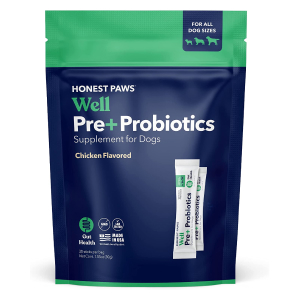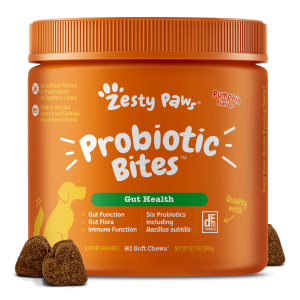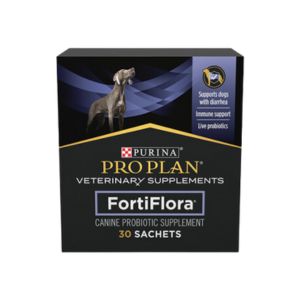 Expert's opinion
Expert's opinion
The article is a subjective view on this topic written by writers specializing in medical writing.
It may reflect on a personal journey surrounding struggles with an illness or medical condition, involve product comparisons, diet considerations, or other health-related opinions.
Although the view is entirely that of the writer, it is based on academic experiences and scientific research they have conducted; it is fact-checked by a team of degreed medical experts, and validated by sources attached to the article.
The numbers in parenthesis (1,2,3) will take you to clickable links to related scientific papers.
Best Probiotic For Dogs 2024: 5 Best Products & Benefits
All articles are produced independently. When you click our links for purchasing products, we earn an affiliate commission. Learn more about how we earn revenue by reading our advertise disclaimer.

Honest Paws Well Pre+Probiotics
- Contains both prebiotics and probiotics
- Easy to administer chicken-flavored chew
- Contains digestive enzymes for a healthy gut
20% Off Coupon: HEALTHCANAL

Zesty Paws Probiotic Bites
- Flavorful soft chew is easy to administer
- Contains six strains of live bacteria to support intestinal health
- Relieves gastric distress and supports immune health

Purina FortiFlora Probiotics For Dogs
- Flavored probiotic powder to sprinkle directly on your dog’s food
- Contains live microorganisms and antioxidants
- Reduces gas and promotes a healthy balance of gut-dwelling microbes
Healthy digestion is essential for nutrient absorption and overall health. As a dog owner, your dog’s health and wellness are your responsibility, which means doing everything you can to support his digestion. Probiotics can help.
The term probiotic is used somewhat loosely in the pet food industry, but it actually refers to live organisms like those found naturally in your dog’s digestive health, which provide certain health benefits. You may think of bacteria as a bad thing, but the truth is they can be extremely beneficial – at least when beneficial bacteria outnumber harmful bacteria.
Here’s what you need to know about dog probiotics, including what they are, whether they work, and how to choose the right one.
Best Probiotics For Dogs On The Market In (April. 2024)
- Honest Paws Well Pre+Probiotics – Editor’s Choice
- Zesty Paws Probiotic Bites – Best Probiotic Treats
- Purina FortiFlora Probiotics For Dogs – Best Powdered Probiotics
- The Honest Kitchen Instant Goat’s Milk With Probiotics – Best Liquid
- Canidae All Life Stages Dry Dog Food – Best Dog Food
Do Probiotics Work For Dogs?
The simple answer is yes, probiotics for dogs work. The key is, however, to find the right product that contains live bacteria and digestive enzymes to support health conditions in your dog’s gut. Whether dog probiotics work or not depends largely on the probiotic strain used in the product and how the product is processed. Harsh processing methods can kill live bacteria, making the product effectively useless.
One of the main ways in which probiotics work is by promoting healthy gut conditions. All of the healthy bacteria and other microorganisms in your dog’s gut are collectively referred to as the microbiome. By helping keep the microbiome in balance, a probiotic supplement can be an incredibly beneficial addition to your dog’s diet.
What Are Probiotics?
Probiotics are microbial strains[1] that deliver health benefits. There is a great deal of research to support their use in both human and animal applications for all kinds of benefits ranging from improved digestion to immune support.
Another way to think of it is that probiotics are friendly bacteria that help maintain proper microbial balance in your dog’s microbiome. Your dog’s body contains both good bacteria and bad bacteria. If bad bacteria outweigh the good, it can lead to a number of health problems, including malabsorption of nutrients and conditions like small intestinal bacterial overgrowth (SIBO) or dysbiosis.
More generally speaking, the term probiotic is often used to refer to products that promote digestive health. Dog probiotics come in many forms, including food, chews, tablets, liquids, and more, which help relieve digestive discomfort issues and support your dog’s immune system. How they work is that the friendly bacteria produce short-chain fatty acids (SCFAs) after consuming fiber. These fatty acids support gut health, improve immunity, and help improve nutrient absorption.
What Are Prebiotics?
If probiotics are beneficial microorganisms that support gut health, prebiotics are the food for those microorganisms. Originally defined[2] by Gibson and Roberfroid in 1995, prebiotics are “non-digested food components that, through the stimulation of growth… of microorganisms residing in the gastrointestinal tract, improve the health condition of the host.”
In other words, prebiotics are food for probiotics. A probiotic supplement that contains prebiotics may be more effective because it provides the beneficial food microorganisms need to thrive.
Best Dog Probiotics To Give Your Dogs
Whether your dog suffers from a specific digestive disorder or general digestive upset, dog probiotics could help. However, before you purchase canine probiotics, it’s important to consider your dog’s individual health needs and determine the best type of probiotic to give him.
Here’s what you need to know about the most effective probiotic strains:
Lactic Acid Probiotics
Some of the most common[3] human probiotics and canine probiotics are made with lactic acid bacteria. Typically derived from fermented milk, lactic acid probiotics consist primarily of Lactobacillus and Bifidobacterium species. On the ingredients list for a supplement or in your dog’s food, you’ll probably see these abbreviated to L. or B. For example, L. acidophilus instead of Lactobacillus acidophilus.
Individual strains of lactic acid probiotics include:
- Lactobacillus acidophilus (L. acidophilus)
- Lactobacillus casei (L. casei)
- Lactobacillus plantarum (L. plantarum)
- Lactobacillus rhamnosus (L. rhamnosus)
- Bifidobacterium animalis (B. animalis)
- Bifidobacterium longum (B. longum)
- Enterococcus faecium (E. faecium)
- Pediococcus acidilactici (P. acidilactici)
The thing to remember about giving Lactobacillus probiotics and other lactic acid probiotics to your dog is that they are fairly fragile. They are typically eliminated from your dog’s gut within 24 hours but, while they may be unlikely to colonize the gut, the DNA they leave behind can still be beneficial.
Soil-Based Probiotics
Some healthy probiotics are spore-forming, unique from lactic acid probiotics, which convert milk sugar into lactic acid. Also known as soil-based probiotics, these beneficial bacteria are classified as Bacilli. Soil-based probiotics are so named because they can often be found in soil, though they can also be found in water.
The most common strains of Bacillus bacteria include:
- Bacillus coagulans (B. coagulans)
- Bacillus indicus (B. indicus)
- Bacillus subtilis (B. subtilis)
What makes soil-based probiotics a good alternative to lactic acid probiotics is that they have higher heat stability[4] and an improved ability to survive low-pH environments like your dog’s gut.
Probiotic Yeast
Brewer’s yeast[5] is a common ingredient in dog food, valued for its high protein and vitamin B content. Certain yeasts like these can also provide probiotic benefits. One of the most commonly used probiotic yeasts in both human probiotics and dog probiotics is Saccharomyces boulardii. This yeast has been evaluated[6] as a therapeutic agent for the treatment and prevention of various gastrointestinal diseases.
How To Choose The Best Probiotics For Dogs?
Pet parents have a responsibility to make informed decisions regarding their dog’s health. Before you change your dog’s diet or give him any kind of supplement, it’s important to do your research. Dog owners should always know what they are putting into their dog’s body.
Here are a few things to look for in probiotics for dogs:
- Determine which type of good bacteria or yeast is used in the product.
- Look for probiotics that contain several strains – especially lactic acid probiotics.
- Choose products with a large number of colony-forming units (CFU) to improve their chances of surviving in your dog’s gut.
- Remember that the larger your dog is, the higher the dose he/she’ll need to obtain the right number of CFU.
- Know that smaller doses will be required for soil-based probiotics than lactic acid probiotics.
- Avoid supplements and dog food made with additives like artificial sweeteners and flavors.
A healthy dog may not need probiotics, so pet parents should talk to their veterinarian before adding a supplement. That being said, most dogs can benefit from a healthy boost to their gut flora as long as it doesn’t interfere with other aspects of overall health.
Read on for some additional tips for shopping for specific types of dog probiotics.
Probiotic Dog Foods
When it comes to dogs, probiotics are a common additive in dog food. By promoting a healthy balance of gut bacteria, probiotic dog foods improve nutrient absorption, relieve digestive distress, and improve various aspects of your dog’s overall health. When shopping for dog food, prioritize recipes that feature high-quality animal proteins – especially as the first ingredient. Avoid low-quality fillers like corn, wheat, and soy as well as recipes that utilize artificial additives like flavors, colors, and preservatives.
When it comes to probiotic dog food, in particular, pay attention to the type of food and the probiotic strains used. Dry dog food is often processed at high temperatures, which can kill live cultures. Raw, fresh, and freeze-dried dog food and other products cooked at lower temperatures are more likely to offer probiotic support.
Probiotic Supplements
While commercial dog food is still regulated by the U.S. Food and Drug Administration (FDA) to some degree, pet supplements are murky territory. Always do your research to determine the quality of a supplement before offering it to your dog. Check for a quality seal from the National Animal Supplement Council (NASC) or a similar organization.
Probiotic supplements for dogs come in various forms, including tablets, probiotic powder, and probiotic treats. Powdered probiotics can be sprinkled onto dry food or stirred into wet food, while probiotic treats can be offered directly.
Other Dog Probiotics
Fermented foods are a healthy alternative to commercial probiotics for both pets and people. Some of the best food sources of probiotics[7] include yogurt, cultured buttermilk, and cheese. Fermented foods like miso, tempeh, sourdough bread, sauerkraut, kimchi, olives, and pickles are good options as well, though arguably more people-friendly than pet-friendly. Perhaps the safest natural sources of probiotic bacteria for dogs are fermented dairy products like kefir and yogurt with live cultures.
Precautions
Not only do dog owners need to be careful about giving their dogs any kind of supplement, but you should be aware of the risks associated with probiotics in particular. For the most part, probiotics are completely safe. That being said, there are more studies on humans than animals, so take that with a grain of salt.
The most common risks associated with probiotics[8] are mild digestive side effects – things like gas and bloating. The other possibility is that the probiotics won’t work at all, either because they are dead or because there aren’t enough of them. There may also be some risk of increased antibiotic resistance[9] related to Enterococci probiotics, though no infections have been reported in animals or humans.
To wrap things up, your dog’s digestive system contains an array of diverse bacteria – some good and some bad. Probiotics help keep that balance tipped in the right direction and can promote numerous aspects of health and wellness, ranging from improved digestion to immune support. When it comes to dogs, probiotics can be a beneficial addition to the diet.
Frequently Asked Questions
Healthy dogs may not need probiotics unless they are experiencing digestive issues. That being said, probiotics can support your dog’s immune system health even if his digestion is fine. They may even help with bad breath.
Allergies in dogs can trigger chronic digestive issues like vomiting and diarrhea, two symptoms that may benefit from probiotics. Just be sure to double-check the ingredients to make sure the probiotic doesn’t contain anything your dog is allergic to.
If you don’t want to buy commercial probiotics, certain foods may offer your dog similar digestive support. Good options include raw goat’s milk and yogurt or kefir made with live cultures.
Look for the type, strain, and the number of probiotics. The higher the number of live cultures, the better and look for probiotics that contain multiple strains as well – especially when using lactic acid probiotics.
+ 9 sources
Health Canal avoids using tertiary references. We have strict sourcing guidelines and rely on peer-reviewed studies, academic researches from medical associations and institutions. To ensure the accuracy of articles in Health Canal, you can read more about the editorial process here
- Azad, Md.A.K., Sarker, M., Li, T. and Yin, J. (2018). Probiotic Species in the Modulation of Gut Microbiota: An Overview. BioMed Research International, [online] 2018, pp.1–8. Available at: https://www.ncbi.nlm.nih.gov/pmc/articles/PMC5964481/.
- Markowiak, P. and Śliżewska, K. (2017). Effects of Probiotics, Prebiotics, and Synbiotics on Human Health. Nutrients, [online] 9(9), p.1021. Available at: https://www.ncbi.nlm.nih.gov/pmc/articles/PMC5622781/.
- Zielińska, D. and Kolożyn-Krajewska, D. (2018). Food-Origin Lactic Acid Bacteria May Exhibit Probiotic Properties: Review. BioMed Research International, [online] 2018, pp.1–15. Available at: https://www.ncbi.nlm.nih.gov/pmc/articles/PMC6191956/.
- Sirima Mingmongkolchai and Watanalai Panbangred (2018). Bacillusprobiotics: an alternative to antibiotics for livestock production. Journal of Applied Microbiology, [online] 124(6), pp.1334–1346. doi:https://doi.org/10.1111/jam.13690.
- Foligné, B. (2010). Probiotic yeasts: Anti-inflammatory potential of various non-pathogenic strains in experimental colitis in mice. World Journal of Gastroenterology, [online] 16(17), p.2134. Available at: https://www.ncbi.nlm.nih.gov/pmc/articles/PMC2864839/.
- Kelesidis, T. and Pothoulakis, C. (2011). Efficacy and safety of the probiotic Saccharomyces boulardii for the prevention and therapy of gastrointestinal disorders. Therapeutic Advances in Gastroenterology, [online] 5(2), pp.111–125. Available at: https://www.ncbi.nlm.nih.gov/pmc/articles/PMC3296087/.
- Syngai, G.G., Gopi, R., Bharali, R., Dey, S., Lakshmanan, G.M.A. and Ahmed, G. (2015). Probiotics – the versatile functional food ingredients. Journal of Food Science and Technology, [online] 53(2), pp.921–933. Available at: https://www.ncbi.nlm.nih.gov/pmc/articles/PMC4837740/.
- Jeżewska-Frąckowiak, J., Seroczyńska, K., Banaszczyk, J., Woźniak, D., Żylicz-Stachula, A. and Skowron, P.M. (2018). The promises and risks of probiotic Bacillus species. Acta Biochimica Polonica. [online] Available at: https://pubmed.ncbi.nlm.nih.gov/30521647/.
- Grześkowiak, Ł., Endo, A., Beasley, S. and Salminen, S. (2015). Microbiota and probiotics in canine and feline welfare. Anaerobe, [online] 34, pp.14–23. Available at: https://www.ncbi.nlm.nih.gov/pmc/articles/PMC7111060/.



